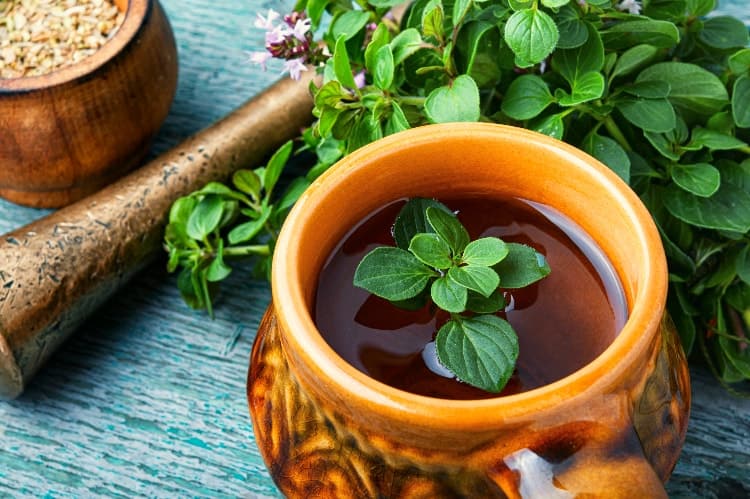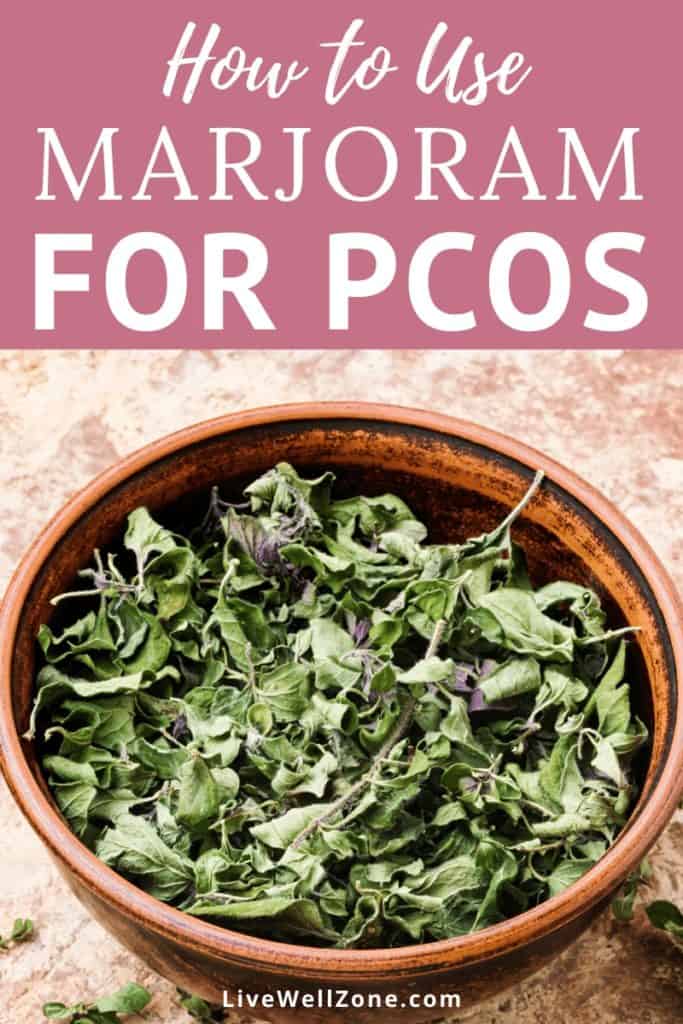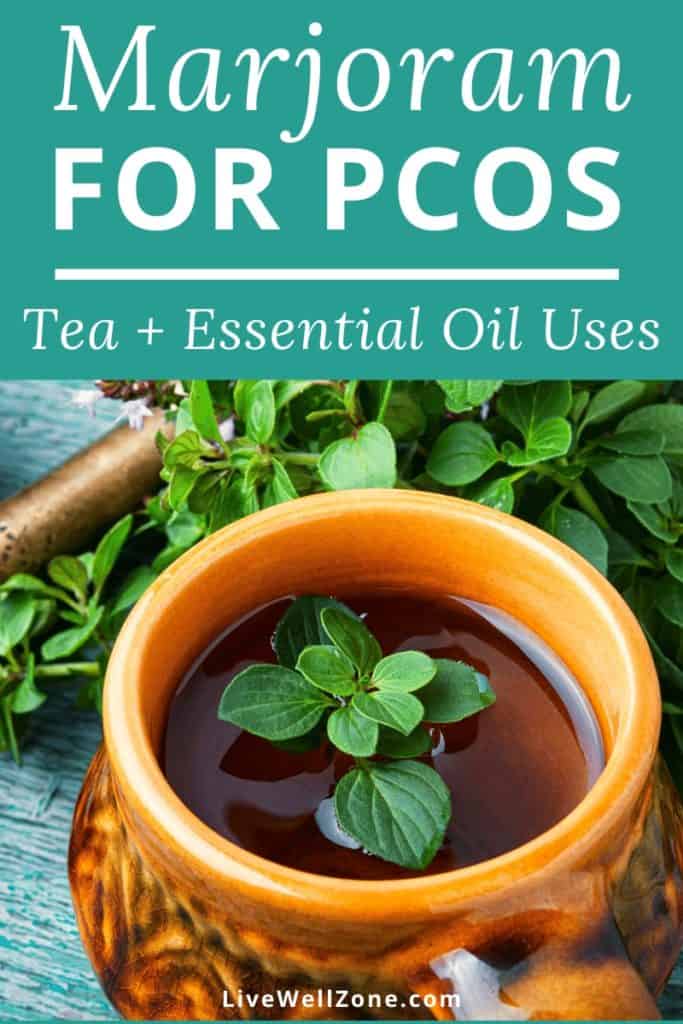
Research suggests that using sweet marjoram for PCOS might help to balance androgen levels, improve insulin sensitivity, relieve cramps and a whole lot more.
Now, in case you’re not familiar with marjoram, it’s a culinary spice that is often used in Mediterranean dishes (sometimes in combination with, or as a substitute for, oregano, thyme and sage).
And given the health benefits it offers, you might want to consider adding marjoram to your PCOS care plan.
So, if you’re curious to learn more about how marjoram may support your health, then keep reading!
MARJORAM BENEFITS FOR PCOS
1. May Relieve Cramps
As I mentioned in this post on home remedies for menstrual cramps, research shows that marjoram essential oil is a natural remedy for period pain.
It’s important to note that the research didn’t test marjoram oil by itself.
Instead, the study used a 2:1:1 blend of lavender, marjoram and clary sage oils (by the way I have the recipe for this blend later in this article).
Given that both lavender and clary sage are also beneficial for hormone balance, it’s no surprise that combining them with marjoram leads to less menstrual pain.
So, if you tend to get severe period cramps, or even if you have cramps without a period, then consider giving marjoram oil a try.
2. May Improve Hormonal Profile and May Restore Missing Period
A 2016 study done with 25 PCOS patients showed that drinking 2 cups of marjoram tea per day resulted in significantly lower levels of the androgen, DHEA-S, as well as lower fasting insulin levels. (source).
An imbalance in androgens and insulin is a major contributing factor to insulin resistance and many other PCOS symptoms (particularly acne, excessive facial/body hair, irregular periods, fertility problems and weight gain).
So, regular consumption of marjoram tea can help your body find its natural balance once again.
In addition, one of the traditional or folk uses of marjoram is an emmenagogue (i.e. an herb that stimulates blood flow to the uterus and pelvic area).
By increasing blood flow to the pelvic area it’s believed that marjoram can help stimulate or restore missing periods.
Now, even though this is a very old and traditional use of marjoram, I wasn’t able to find more information (i.e. studies) about marjoram’s emmenagogue properties.
Note: ginger is another emmenagogue that may help with PCOS. Read more about using ginger for pcos.

3. Fights Inflammation
The amount of toxins that we’re exposed to via food, air and cosmetics contributes significantly to inflammation.
And not only can inflammation trigger PCOS symptoms, but it can also worsen existing symptoms.
Sweet marjoram happens to contain antioxidants (such as carvacrol) that fight inflammation.
Therefore, regular use of marjoram may help combat the chronic inflammation often associated with PCOS.
4. Calms The Nervous System
Having PCOS means being at increased risk for high blood pressure and heart disease.
Marjoram may help you counteract this thanks to its high antioxidant content (which supports a healthy cardiovascular system).
In addition, marjoram relaxes and widens blood vessels.
When your blood vessels are relaxed there’s not much pressure required to pump blood. This means your blood pressure naturally also goes down to a healthy level.
Oh, and if all that isn’t enough…inhaling marjoram oil has been shown to reduce our fight-or-flight response.
The fight-or-flight response is tied to the release of cortisol from the adrenals (which then affects insulin, estrogen and androgens).
So, in order to improve PCOS symptoms naturally, it’s important to keep the fight-or-flight response and cortisol in check.
And guess what…a happy nervous system means you’re less stressed, which means your blood pressure naturally drops and your heart is also healthier.
It all ties together nicely 🙂
5. Improves Digestive Issues
Stomach cramps, bloating, constipation and diarrhea are digestive problems that can occur with PCOS.
As it turns out, marjoram is quite effective as a digestive aide and it can alleviate many of these issues.
By supporting your digestive system, it also becomes easier to eliminate toxins and ultimately, reduce inflammation.
HOW TO MAKE MARJORAM TEA FOR PCOS

The basic guidelines for making marjoram tea is to use 1 teaspoon dry herb (or 2 teaspoons fresh herb) for every cup of water.
Now, having said that you can do even higher amounts of herb, especially when you’re using the marjoram tea for medicinal purposes.
In fact, according to famed herbalist, Rosemary Gladstar, you can use as much as 1.5 tablespoons dry herb (3 tablespoons fresh herb) for every cup of water (source).
So, even though the recipe I’m about to share with you uses the basic guidelines, feel free to increase the amount of marjoram you use.
Also, keep the following in mind when using marjoram tea for pcos:
- Drink to 2 to 3 cups marjoram tea a day. For example, 1 cup in the morning and another in the late afternoon.
- It’s important to spread out your consumption of the tea because your body can only absorb so much in one go. If you try to drink it all at once, a lot of it will simply go to waste.
Alrighty, now let’s have a look at the basic recipe for making marjoram tea.
Ingredients
6 teaspoons (2 tablespoons) dry marjoram
6 cups water
How to Make
- Boil the water and pour into a tea maker (or a heat safe glass pitcher).
- Add the dried marjoram to the water and cover the mix.
- Allow to steep for at least 30 minutes.
- Strain the tea leaves.
- Store the tea in the fridge. It will stay fresh for up to 4 days.
HOW TO USE MARJORAM OIL FOR PCOS

Using marjoram oil for PCOS can alleviate menstrual cramps as well as relieve stress, tension and anxiety.
Here are a couple of recipes – one for a massage oil and the other for a diffuser blend – that you can use.
Marjoram Oil Blend for PCOS Cramp Relief
18 drops lavender oil
4 drops clary sage oil
4 drops marjoram oil
1 ounce glass bottle
Almond oil (or other liquid carrier oil)
- Add the essential oils to the glass bottle.
- Fill up the bottle with almond oil.
- Close and shake well to combine ingredients.
- Massage onto the lower belly or lower back when cramps hit.
Note: this recipe uses a 3% dilution (the same one that was used in the reference study I mentioned earlier). If you need to adjust the dilution, use this essential oil dilution guide.
Marjoram Oil Diffuser Blend for Relaxation
One of the folk uses of marjoram is as a funeral herb. This is due to its ability to help with sadness, anxiety and sleeplessness.
Given the intense emotional toll of PCOS, simply inhaling marjoram can help you experience more ease and spaciousness.
- Combine 4 drops mandarin, 2 drops lavender and 2 drops marjoram in a diffuser.
RELATED QUESTIONS ABOUT MARJORAM AND PCOS
What herbal tea is good for PCOS?
Chamomile, spearmint, red raspberry leaf, peppermint, dandelion and milk thistle are a few herbal teas that are good for PCOS.
Is milk good for PCOS?
Conventional dairy milk is not ideal for PCOS because it contains antibiotics and growth hormones, both of which contribute to inflammation, poor gut health and hormone disruption.
A better option is plant-based milks (like almond, macadamia or oat milk).
Is beetroot good for PCOS?
Since beets support the liver, regulate blood sugar, support weight loss and boost detoxification, they’re a great addition to your PCOS diet.
For more about beets, read this post on beets and hormone balance.
Is Ashwagandha good for PCOS?
Studies show that ashwagandha lowers blood sugar and cortisol, while also fighting inflammation. This makes it a beneficial adaptogenic herb for PCOS.
If you’d like to learn more about ashwagandha and other similar herbs read this article on adaptogens for PCOS.
Is green tea good for PCOS?
Absolutely! Green tea is packed with antioxidants and it’s also great for supporting the liver and fighting inflammation.
Although there are various types of green tea you can use, one of the best is matcha.
Matcha green tea provides more health benefits because it’s the entire green tea leaf, ground to a powder.
Learn more in this post on how to use matcha green tea for hormone balance.

CONCLUSION
Whether you use the whole herb or the essential oil, has significant benefits that can improve PCOS symptoms.
Just keep in mind that as with all natural remedies, one herb or oil doesn’t usually fix everything.
So, whether you decide to use marjoram (or other pcos remedies like ginger or matcha), you’ll get the best results if you weave them into a healthy PCOS diet.
I hope this article was helpful and gave you some insight into how you can take advantage of all that marjoram has to offer.
If you have any questions or feedback on this topic, feel free to drop a comment below 🙂
Related Posts:
How to Make a Fertility Smoothie For PCOS: A Simple Guide
How to Get Rid of PCOS Naturally: 7 Steps To Start Following Today
Spearmint Oil And PCOS: Benefits and How To Use It
5 Natural Alternatives to Clomid
Why You Need Turmeric for PCOS + 4 Ways To Use It
A Complete Guide to Using Cinnamon for PCOS: For Acne, Weight Loss, Menstrual Cycle and More!
Benefits of High Protein Foods for PCOS and Which Ones You Should Eat


